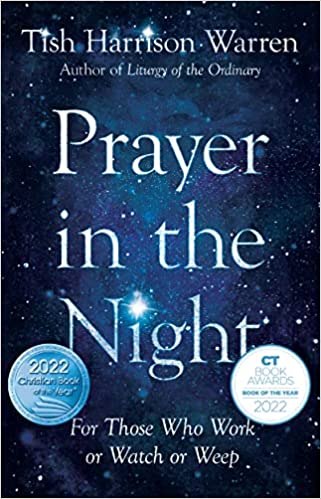I am looking forward to continuing our discussion of the Rev. Tish Harrison Warren’s book Prayer in the Night: For Those Who Work or Watch or Weep. For Tuesday, please read Chapter 2: “Keep Watch, Dear Lord: Pain and Presence.” If possible, please give yourself time to be able to read the chapter slowly and to think and pray through her message.
The Prayer:
Keep watch, dear Lord, with those who work, or watch, or
1979 BCP 134
weep this night, and give your angels charge over those who
sleep. Tend the sick, Lord Christ; give rest to the weary, bless
the dying, soothe the suffering, pity the afflicted, shield the
joyous; and all for your love’s sake. Amen.
The Promises of God:
The final prayer of Compline opens with the plea “Keep Watch, Dear Lord.” Rev. Warren’s discussion begins with an absence of God’s promise. God promises many things and we can trust God as to many things. From a Christian perspective, the great promises of God are God’s promise to Abram that “by you all the nations of the earth will be blessed” (Gen. 12:3, Gal. 3) and Jesus’ promise to his followers that he will be with us until the end of the age (Matt. 28:20). Abraham trusted God, and we can trust God. But, as Rev. Warren quotes her former pastor “‘You cannot trust God to keep bad things from happening to you.’” p.22.
This absent promise is not simply that bad people may do bad things to you. In fact, Jesus promises us that this should be expected. John 15:20. But God also does not promise us that he will never give us more than we can handle. We know this, if not from our own direct experience, then from the experience of others who have PTSD, have gone mad, or have taken their own life. God cannot be trusted to spare us from the ill vagaries and misfortunes of life.
Theodicy:
The technical term for the question that Rev. Warren raises is “theodicy” – Why does a good, all-mighty, and all-powerful God permit evil to occur to someone? This is the question that the book of Job attempts to answer and the book of Ecclesiastes laments. We previously looked at theodicy in our discussion of Creation. The existence of evil attacks our very understanding of God. The skeptic David Hume (1711-1776) paraphrasing the ancient Greek philosopher Epicurus (341–270 BC) asks: “Is he (God) willing to prevent evil, but not able? then is he impotent. Is he able, but not willing? then is he malevolent. Is he both able and willing? whence then is evil?”
Rev. Warren points out that a “theodicy is not a cosmic algebra equation, where we can simply solve for x.” p.24. She quotes Flannery O’Connor’s statement that “evil is not a problem to be solved, but a mystery to be endured.” Mystery and Manners, p.209. Because the Logos (or Word, see John 1), is Reason and Intelligence, and since evil is not of God, then evil is neither Reasonable nor Intelligible. There is simply no answer, and any answer we give will necessarily fail. Suffering and evil are “an absurd and inexplicable abnormality, a gross absence of the good and the true.” p.25.
(If you want to go a little deeper, a good discussion from David Bently Hart on the theodicy of the 2004 tsunami is HERE and our prior discussion on theodicy and creation is HERE. If you want to go a lot deeper, read chapter 4, paragraphs 18-35, of Dionysius (5th c.) On The Divine Names and The Mystical Theology (begin on p.58).)
God’s Inaction:
Rev. Warren points out that we do not want answers. Even if we could put God on the witness stand and demand and receive an answer to the problem of evil and suffering, we would not be satisfied. Think about someone who dies too early. Our knowledge of the medical reasons as to why that person died, does not make the death easier to endure. What we want from God is action. What we want from God is to make things right, right now. Like Martha at Lazarus’ tomb (John 11) we do not want all things to be set right at the end of the age. Rather, we want them to be set right today. But that is not what happens. The question, therefore, that we must face is “How do we trust a God who does not stop [bad things] from happening? How do we dare ask him to keep watch?” This is for our discussion on Tuesday.
Dinner begins at 6. The menu is chicken saltimbocca. Discussion about 6:45. Compline at 8. Hope to see everyone here.
Then Job answered the Lord:
Job 40:3-5
“See, I am of small account; what shall I answer you?
I lay my hand on my mouth.
I have spoken once, and I will not answer,
twice but will proceed no further.”


Pingback: Prayer in the Night – Those Who Watch: Attention – Ancient Anglican
Pingback: Prayer in the Night – Tend the Sick, Lord Christ, pt.1 – Ancient Anglican
Pingback: Prayer in the Night – All for Your Love’s Sake: Dawn – Ancient Anglican